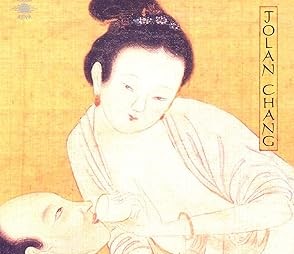

Sex, Food and Divinity...
By edentu OROSO
 Cover of Jolan Chang's The Tao of Love and Sex (Photo Credit: Amazon UK)
Cover of Jolan Chang's The Tao of Love and Sex (Photo Credit: Amazon UK)
Sex, food, and divinity are three fundamental tripods upon which the human experience revolves. Each leg of this tripod bears its own inflection in the grand narrative of existence. Each impels a force of its own, yet all converge in a communion that defines our being. They are interwoven, interdependent, and inescapable bridges. No mortal has eluded the entire gamut of the webs these elements spin across the reel of life.
Sex, to the best of human imagination—that’s ever wandering, ever probing—holds multiple meanings. The first and most primal reality: sex is the instinct for procreation. It is the biological mechanism through which human form takes shape and finds manifestation on Earth. Whether steeped in romantic overture or arising from the basest of circumstances, the union of male and female produces the miracle of creation. This, undeniably, is the fulcrum of human continuity.
The second reality of sex is its role in hedonistic expression. It becomes a consensual exchange of pleasure, a carnal indulgence experienced by male and female alike in the natural order of things. In recent decades, its expressions have broadened within LGBTQ spheres—an evolution, albeit considered by some as a deviation from traditional norms. Regardless of perspective, this dimension of sex dominates contemporary life for many.
The third and perhaps most esoteric reality: sex, when consciously harnessed, becomes a vortex of transcendence for the spiritual initiate. Properly channelled, sexual energy aids the ascent of the being along the spirals of consciousness. This is the realm of Kundalini awakening—where the life force at the base of the spine rises to the pineal glands at the base of the brain, igniting higher awareness and a holistic consciousness of body, mind, and soul.
Thus, sex serves as a vehicle for procreation, pleasure, and spiritual ascent. The manner of its expression determines whether one ascends to the pinnacle of consciousness or descends to its nadir.
Schools of Tantric Yoga emphasise conserving this spiritual energy through abstinence or moderation for the sake of inner growth. To them, sex is sacred—never to be trifled with.
I recall reading a book a few decades ago titled The Tao of Love and Sex by Jolan Chang, which focuses on the ancient Chinese way to ecstasy. Born in Hangzhou, China, in 1917, Chang was a Chinese-Canadian sexologist and Taoist philosopher. He is renowned for interpreting ancient Taoist sexual teachings into a modern context. His work emphasizes the importance of sexual health, male restraint, female pleasure, and the integration of sensuality with spiritual well-being. Chang passed away in Stockholm in 2002.
In the Tao of Love and Sex, Chang advocated a specific number of sexual engagements per year, adjusted according to age, for those who wished to live long. The argument was straightforward: the more indulgent one becomes in sexual activity, the more likely one is to die young.
The rationale behind this claim is that the energy released during sex is the vital life force. Excessive loss of it diminishes vitality. Conserving this energy through moderation or abstinence, on the other hand, increases longevity by redirecting the life force toward creativity, awareness, and inner vitality.
Contemporary discourse, often fuelled by a flood of contradictory studies online, frequently posits that inadequate sexual activity is a contributing factor to prostate enlargement or cancer in middle-aged men. While such assertions may contain a sliver of biomedical insight, they risk reducing sex to mere mechanics. In the realm of esoteric wisdom, sexuality transcends the physical—it is regarded as a sacred current of life force, a potent energy not to be squandered. Here, sex is not a remedy to be prescribed, but a ritual to be revered—engaged with intention, restraint, and spiritual awareness.
Food, on the other hand, is an irreplaceable component of our existence. While one may live fully without sex, survival without food is impossible. Yet food, too, carries a paradox. Overindulgence becomes a hindrance to spiritual growth and a threat to physical health. The body’s cells and tissues rely on food for rejuvenation and optimal function. Our entire biological system hinges on food intake, metabolic processing, and the subsequent release of nutrients—proteins, carbohydrates, vitamins—essential for life.
But for the seeker of truth, excessive food consumption is more a curse than a blessing. It weighs down the spirit with coarse material energy, making transcendence more difficult. In contrast, the food of the spirit is ether or prana, as described in esoteric texts—spiritual energy that sustains and uplifts. This energy builds and is maintained only through right eating habits and meditation.
Meditation, in this sense, is not mere chanting or repetitive prayer. It is a deeper communion with the Source, enabling one to tap directly into the energy that atomises the universe—the ether, the prana, the photons of divine light.
Picture the spirit as a balloon lifted by a current of hot air. When that air ceases to rise from beneath, the balloon deflates and falls. So too the human body: the moment the life force ceases to flow, death ensues.
Divinity, at its core, is man’s return to Source. It is the awareness of origin, the harmony of self with the ocean of universal consciousness. Divinity transcends religion; it is not bound by dogma. Rather, it is the experience of self-realisation—man recognising the infinite within himself. It is the cosmic dance of knowing that while man is but a speck of the universe, the universe itself is contained within that speck. He is, in essence, the universe made flesh.
The nexus between sex, food, and divinity emerges not merely as evident, but as profound. These are not just biological urges or survival rituals—they are portals into the sacred, thresholds where flesh and spirit converge. In the mystery traditions of East and West alike, this triad—eros, nourishment, and the divine—serves as a cipher for decoding existence.
In the Kabbalistic Tree of Life, Yesod—the foundation governing sexual energy—acts as a bridge between instinct and higher consciousness, ascending toward Keter, the crown of divinity. Sex, then, is not a shameful necessity, but the pulsating engine of life—a divine echo of Ein Sof, the infinite.
Food, too, carries sacred weight. In The Gospel of Thomas, Jesus declares, “If you fast not from the world, you will not find the kingdom.” Yet, he also breaks bread—suggesting that conscious eating becomes sacrament. Like the Eucharist, the act of nourishment is not merely digestion, but communion: grain into body, grape into blood, matter into spirit.
Ancient Hindu texts, such as the Taittiriya Upanishad, speak of the annamaya kosha, the "sheath of food," as the body's outermost layer. Beyond it lies the anandamaya kosha, the sheath of bliss—affirming that the path from sustenance leads to divine joy, ?nanda.
Sex and food, far from distractions, are vehicles of the sacred. The Song of Songs, that lyrical biblical ode, praises the lover’s body with the reverence of temple artifacts: “Your navel is a rounded goblet that never lacks blended wine. Your waist is a mound of wheat encircled by lilies” (7:2). Erotic intimacy and agricultural abundance—flesh and field—are sanctified in unison.
The early Church Fathers, particularly within the desert mystical tradition, recognised this interweaving. Saint Augustine, in Confessions, reflects on how bodily hunger and sexual desire mirror the soul’s deeper yearning: “You have made us for yourself, O Lord, and our hearts are restless until they rest in you.” That restlessness marks the human condition—not just for touch and taste, but for the Source behind all longing.
These elements are not discrete compartments of life, but interwoven currents flowing into the ocean of being. To eat is to remember creation, to reconcile with mortality. To make love is to echo genesis. To worship is to reach beyond the flesh—through it. They are not contradictions, but concentric circles of the same sacred fire.
To understand one deeply is to sense the resonance of the others. The Tantric Yogi tasting sacred food, the mystic in silent prayer, the lovers in their union—all ascend the same ladder, each rung purified of ego, each act a step toward the Divine.
Together, they embody the totality of our condition: our biology, our longing, our transcendence. We eat, we love, we worship. And in each act, when imbued with presence and reverence, we do not descend into flesh—we rise into light.











Comments
Be the first to comment on this post
Leave a Reply